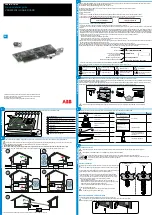
2.
Press the Calibrate button for 1 second. The LCD screen will
display the signal strength of the light. The signal strength
should ideally be at least 3 bars. Orient the logger as
necessary to increase the signal strength.
3.
Press the Calibrate button for 3 seconds while “HOLD”
appears on the LCD screen. Move your hand away from the
logger to prevent shadowing. The logger will count down to
the auto-calibration and then display either “PASS” or
“FAIL” after calibration is complete.
4.
If the auto-calibration fails, point the sensor directly at the
light source and then repeat these steps.
If you cannot manipulate the light source, you can set the
calibration level in HOBOware. To do this:
1.
Click the Advanced button in the Launch Logger window.
2.
The lower the light level, the higher the sensitivity needs to
be to record changes between ON and OFF conditions.
Therefore:
•
For rooms with low light levels, such as residential
environments, select “Set to maximum sensitivity,” which
has a threshold set to approximately 100 lux.
•
For rooms with high light levels, such as retail
environments, select “Set to minimum sensitivity,” which
has a threshold set to approximately 500 lux.
Note:
The sensor is sensitive to lights that emit high
amounts of infrared radiation like incandescent and
halogen bulbs. It is best to use auto-calibration when
possible when monitoring on/off conditions for lights with
high infrared radiation.
3.
Click Save. Note that the selections will not take effect in
the logger until you launch it.
Reading Out the Logger
There are two options for reading out the logger: connect it to
the computer with a USB cable and read out it with HOBOware,
or connect it to a HOBO U-Shuttle (U-DT-1, firmware version
1.15m030 or higher) and then offload the data files from the
U-Shuttle to HOBOware. Refer to the HOBOware Help for
details.
Recording Internal Logger Events
The logger records the following internal events to help track
logger operation and status:
Internal Event Name
Definition
Host Connected
The logger was connected to the computer.
Started
The Start/Stop button was pressed to begin
logging.
Stopped
The logger received a command to stop
recording data (from HOBOware or by
pushing the Start/Stop button).
Internal Calibration
The logger was calibrated via auto-
calibration (button calibration).
Host Calibration
The logger was calibrated via HOBOware.
Calibration Failure
Calibrating the logger has failed.
Button Up/Button
Down
The Start/Stop button was pressed for
1
second.
Safe Shutdown
The battery level dropped below 2.5 V; the
logger performs a safe shutdown.
Mounting the Logger
There are several ways to mount the logger using the materials
included:
•
Use the four built-in magnets on the back of the logger to
mount it to a magnetic surface.
•
Attach the Command strip to the back of the logger to
mount it a wall or other flat surface.
•
Use the double-sided tape to affix the logger to a surface.
•
Insert the hook-and-loop strap through the mounting
loops on both sides of the logger to mount it to a curved
surface, such as a pipe or tubing.
Protecting the Logger
The logger is designed for indoor use and can be permanently
damaged by corrosion if it gets wet. Protect it from
condensation. If the message FAIL CLK appears on the LCD
screen, there was a failure with the internal logger clock
possibly due to condensation. Remove the battery immediately
and dry the circuit board.
Note:
Static electricity may cause the logger to stop logging.
The logger has been tested to 8
KV, but avoid electrostatic
discharge by grounding yourself to protect the logger. For more
information, search for “static discharge” in the FAQ section on
onsetcomp.com.
Battery Information
The logger is installed with a 3V CR2032 battery (HRB-TEMP).
Expected battery life varies based on the ambient temperature
where the logger is deployed, the logging interval, the rate of
state changes, the frequency of offloading to the computer,
and battery performance. A new battery typically lasts 1 year
with a logging interval greater than 1 minute. Deployments in
extremely cold or hot temperatures or a logging interval faster
than 1 minute may reduce battery life. Estimates are not
guaranteed due to uncertainties in initial battery conditions and
operating environment.
Office: Jl. Radin Inten II No. 62 Duren Sawit, Jakarta 13440 - Indonesia
Workshop: Jl. Pahlawan Revolusi No. 22B, Jakarta 13430 - Indonesia
Phone: 021-8690 6777 (Hunting)
Fax: 021-8690 6777
Mobile: +62 816 1740 8925
Fax: 021-8690 6771























